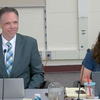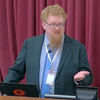GCSD plans summit, searching for out-of-the-box solutions
The Enterprise — Melissa Hale-Spencer
“I accept this on behalf of everyone at Westmere,” said Beth Bini, left, the principal of Westmere Elementary School, as Superintendent Marie Wiles presented her with a certificate from the State Education Department, naming Westmere as a “Reward School,” meaning it has high achievement without any gaps. Two other Guilderland elementary schools have also received the designation — Altamont and Pine Bush.
GUILDERLAND — The school district is planning what it calls a summit conference for Nov. 19 in hopes of hatching a solution to its problems of declining enrollment and stagnant funding.
The meeting will be held at Tech Valley High School on the campus of SUNY Polytechnic Institute. The Tech Center will hold no more than 100 people, which will also include school board members and administrators.
Superintendent Marie Wiles told the school board Tuesday night that the off-campus location would be “a draw for people not from school.” She said, “It takes us out of the box…We jumped out…It’s an idea we haven’t tried before…There’s some edginess to it.”
The meeting is being held after a controversial consultant’s report on building capacity released in June concluded with six scenarios — one maintained the seven district schools as they are now for no cost savings. Four would have closed Altamont Elementary and one would have closed Lynnwood Elementary. Consultant Paul Seversky calculated the annual savings for the closed schools at $1.2 million to $2 million. This year’s district budget is $92 million.
Altamont residents strenuously objected to the proposals and raised concerns about the data’s veracity. In September, the board, in a 7-to-2 vote, set aside the scenarios, making the plan to hold focus groups to discuss the scenarios moot.
On Sept. 29, the district held an informational session, attended by about 30 people, to explain Seversky’s finding and to answer questions and concerns.
“We have these problems,” Judy Slack, chairwoman of the communications committee that is planning the summit, told the board members on Tuesday. “We can’t cut our way out of them. We can’t tax our way out of them…We still have the capacity issue…We need to either generate income or save money.”
Guilderland has stayed under the state-set tax-levy cap since it was imposed three years ago, and it has cut 228 jobs to close annual multi-million-dollar budget gaps. A $1.4 million gap is predicted for next year.
Slack described the Nov. 19 meeting as “an interactive session of brainstorming a solution” to the problem of excessive space and limited resources.
“Why are we going off site?” asked board President Barbara Fraterrigo.
“This room is where we’ve heard we can’t close Altamont,” responded board member Colleen O’Connell, a member of the communications committee. She and Slack were the two board members who had voted against setting aside Seversky’s scenarios.
The board’s usual meeting space, the large-group instruction room at the high school, had been filled with Altamont residents wearing red T-shirts, emblazoned with the words, “It takes a village…”
“Are we still looking for a cross-section?” asked Fraterrigo.
“Absolutely,” responded Slack.
The board had initially postponed the focus-group session because most of the applicants were from Altamont. The goal is to include residents of all five elementary-school cachement areas as well as representatives of businesses and community groups.
O’Connell said that participants would have to live in the district; the rule would apply to faculty and staff as well.
There was some debate on whether it should apply to business owners too.
Board member Christine Hayes pointed out that people who own businesses in Guilderland, even if they don’t live in the district, are a “big part of the community.”
Board member Jennifer Charron agreed, saying out-of-district business owners still pay Guilderland school taxes and therefore should be included in the discussion.
“The goal is to get a broad cross-section and set up groups to respond to a broad-based question or two,” said Wiles. “Everyone gets a pen and a big sheet of paper.”
After 10 to 12 minutes, each group would rotate to a new station and build on the ideas written down by the group that had preceded it.
“What’s our role?” asked board member Christopher McManus.
“Don’t worry; we’ll let you know,” Wiles responded.
O’Connell said she had been frustrated during some of the “community conversations” the district had held in recent years as part of the budget process, where the groups were facilitated by employees of the Board of Cooperative Educational Services. A single curmudgeon could dominate a group, O’Connell said, and, when facilitators, reported out to the group at large, the facilitators could “bring their own consensus,” said O’Connell.
However, with the proposed format for Nov. 19, she said, “You’ve got your pen. Nobody can shut you up…We don’t need a facilitator…You can have your own little say on this. You don’t have to come to consensus.”
Charron was pleased that the district wouldn’t have to pay for BOCES facilitators. “Put us to work for free,” she said of board members.
“The board needs to remain out of the conversation,” insisted Wiles. She said of administrators and board members, “We have baggage.”
Board members had some back-and-forth discussion on the best date for the summit. Some felt sticking to an already-changed date for the focus groups would be less frustrating for people who had planned to attend a Nov. 6 session. The prevailing view, though, was that the added two weeks would allow more time to plan a better session and to recruit a wider variety of participants.
“The board changed what it was going to be discussing,” said Slack of Seversky’s scenarios being scrapped. “We had to start over.”
“It will take time to make phone calls to PTAs,” said O’Connell.
“We have working lists from advocacy events,” said Wiles. She also said the 40 or so people who had applied to be in the focus groups would be contacted.
Further, Wiles said, she would reach out to Erika Gauthier, director of the Guilderland Chamber of Commerce; to Donald Reeb, president of the McKownville Improvement Association; and to the senior center.
“Get a broad brush of everyone in the community,” said board Vice President Allan Simpson. “So there isn’t this dominant force that comes in and takes over and skews it.”
Other business
In other business, the board:
—Accepted, by unanimous vote, the independent audit report for the fiscal year ending June 30, 2014 as recommended by the board’s audit committee. Timothy Doyle, a partner with the Bonadio Group, went over both the basic financial statements and the extra-classroom activities report, noting “unmodified opinions” throughout.
“We’re happy to note there was no non-compliance,” he said, for example if the district had over the state-set 4 percent of its budget in its fund balance. He also said, “You have been a low-risk auditee for recent years.”
Assistant Superintendent for Business Neil Sanders acknowledged John Rizzo: “He’s done a great job…and the rest of the business office as well.”
Wiles, in turn, praised Sanders and said, “This is the third year in a row with a completely clean audit”;
— Reviewed long lists of professional development opportunities for staff, supplied by Assistant Superintendent for Instruction Demian Singleton. He provided a catalogue listing of 150 topics offered from 2013 till now; a report on conference activities from July 2012 till now with over 200 topics taken by 287 teachers; and, for the same time period, a report on in-service credit with 1,006 approved activities.
Singleton said that “embedded” professional development was used to “address targeted areas of need.” For example, because of the large number of special-needs students at Lynnwood Elementary School, literacy coaches have been embedded at the school.
Also, he said, because Guilderland is committed to “early intervention” to preclude long-term less-effective help later, each elementary school now has at least one certified Reading Recovery teacher. Guilderland has become a regional training center in Reading Recovery, providing additional revenue for the district.
Singleton listed training in fields as diverse as instructional technologies and cardiopulmonary resuscitation certification.
“It’s very impressive, the breadth and the different modes of delivery,” said board member Gloria Towle-Hilt, who had requested the update;
— Learned that Laura Halgren-Flynn, an Altamont Elementary reading teacher, co-wrote an article in The Reading Teacher Magazine, “Reading Thematically Related Texts to Develop Knowledge and Comprehension”;
— Heard from Singleton that Guilderland will host a Google Apps Summit on April 25 and 26. “The Ed. Tech Team will bring in an array of national and international presenters at Guilderland High School,” he said, adding, “We’re thrilled”;
— Heard from Sanders the eight-month timetable for developing the 2015-16 district budget. The first chance for public input is at the Nov. 5 board meeting. The superintendent is to present her budget on March 5; the board is to adopt a spending plan on April 21, and the public is to vote on May 19;
— Discussed at length resolutions that will be taken up at the New York State School Boards Association annual meeting;
— Approved a service agreement for the 2014-15 school year with the Access Therapy Group for students with disabilities. Lisa Knowles, the district’s new director of pupil personnel services, said it was a temporary measure for the remainder of the year as she evaluates student needs. Knowles said she had worked with the Access Therapy Group previously and was pleased with its work; she also noted that the same therapist works with a child throughout the year. Knowles said, too, she would do a cost analysis to see if it is more or less expensive to contract out physical-therapy and occupational-therapy services or to do them in-house. “There are pros and cons to both,” she said;
—Approved agreements for federal IDEA (Individuals with Disabilities Education Act) Flow-Through Funds with the Early Childhood Learning Center and Wildwood School;
— Amended a memorandum of agreement the district had made with the Guilderland Teachers’ Association on annual professional performance reviews. Wiles explained the teachers had agreed to ways to calculate local and growth scores to meet state requirements while reducing the number of tests given to students. “A couple of departments after the fact wanted to join the plan,” she explained. “We said, ‘Of course.’” The two departments are art and physical education;
— Approved the formation of two new clubs at the high school: Pens to Paper, advised by Shannon Clegg, in which members will write and share their writing, and Chem Club, advised by Alicia McTiernan, which is to help students better appreciate chemistry and get involved in the community. Neither advisor will be paid; and
— Met in executive session “to discuss the employment history and job performance of particular persons and matters leading to potential discipline or dismissal,” according to the agenda.


